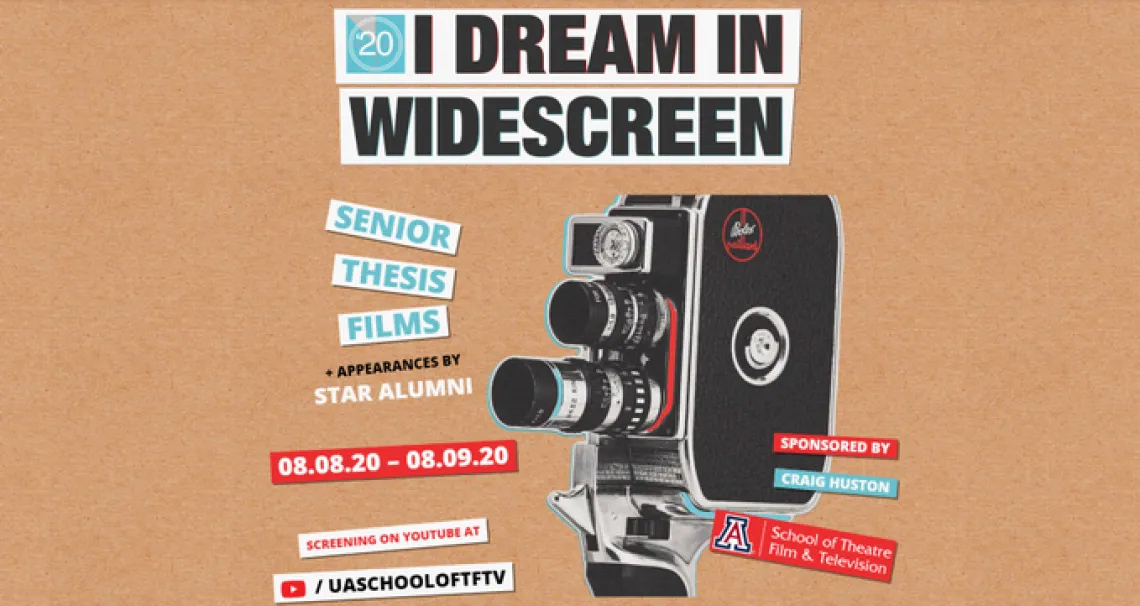I Dream in Widescreen: Senior Capstone Goes Digital
Scott Weber is a revered Hollywood sound artist who has garnered a host of awards during his 29-year career, including Emmy awards for the hit shows “Lost” and “Westworld.”
“It looks glamorous, but it’s a lot of hard work,” he says cheerfully from his home studio in Los Angeles.
In March, he got a last-minute assignment he never could have anticipated: He was enlisted to work on the sound for 14 short movies created by senior BFA film majors in the University of Arizona’s School of Theatre, Film & Television, or TFTV.
The students’ thesis projects had been derailed, like so many other things, by the coronavirus pandemic.
The films, averaging seven minutes in length, represent the culmination of yearlong capstone projects. The 17 filmmakers were in the final production stages when the pandemic hit and still needed to mix in sound.
Professor Lisanne Skyler decided to reach out to Weber for help.

The sound pro already had a connection to the university. His son, Jonathan Weber ’11, graduated from TFTV; he now works with Turner Broadcasting. Weber made several visits to campus when his son was a student, giving industry lectures to film and TV majors.
“I saw then how good he was with the students,” says Skyler. She and Weber have been in touch ever since.
In March, she sent him an email. “We have a situation,” she said. Weber was sympathetic to the students’ plight — and, since the pandemic had forced the postponement of some of his projects, he had some free time.
“It was great,” says Adrian Meyer, a TFTV student. “It was just like magic. [The films] came back 20 times better.”
Weber, who has been an adjunct instructor at The Master’s University in LA, consulted remotely with each student. He provided them with constructive feedback on their films and provided sounds to add to their soundscape.
After a final consult, Weber himself did the mixing of all 14 films.
“We were so excited,” says Alyssa Urgo, whose movie is inspired by the real-life story of her little sister’s adoption. “It was fantastic. Sound is so important, and he helped all of us.”
Meyer’s film, about a young boy whose sister is a drug addict, “is in an outside environment with lots of sounds,” he says. “[Weber] made my movie better.”
Mason Day made a no-dialogue film that consists of choreographed movement by one actress, theatre student Lauren Vialva. Weber was very helpful in completing the project, Day says.
With the student films in good shape, the school had one more problem to solve.
For the last 14 years, TFTV has hosted an evening gala, called I Dream in Widescreen, to premiere seniors’ films for a packed audience of family and friends. The glittery end-of-semester event is traditionally held at the downtown Fox Tucson Theatre.
“We’ve looked forward to this for years,” Meyer says. “We’ve watched each year, and we were really excited to be in it.”
This year, the school has transformed the single-evening gala into a two-day digital showcase and virtual festival.
An awards ceremony will follow screenings of the shorts. The films have been sent to a jury of professionals including Allison Vanore, Emmy Award-winning producer of the series “After Forever”; film critic Katie Walsh; and Rob Gonzalez, Austin Film Festival competition director.
“There will be really cool things,” says Urgo, who interned with the I Dream in Widescreen marketing team.
Along with the hot-off-the-press movies, there will be speakers and a live Q&A. And university alumni who have made a splash in the industry will be on hand, virtually, to give career tips to students. One of them, Mike Plante ’94, a film director and producer, is the senior programmer for short films at the Sundance Film Festival.
Perhaps best of all, more people will be able to watch from around the country, and film professionals can participate.
Urgo, for one, is thrilled that her Chicago family can watch her film.
“Some of them wouldn’t have been able to come out,” she says. “Now they will see it!”
